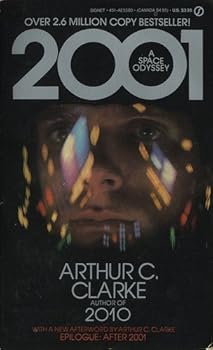Book Overview
2001: A Space Odyssey is the classic science fiction novel that changed the way we looked at the stars and ourselves.... 2001: A Space Odyssey inspired what is perhaps the greatest science fiction film ever made--brilliantly imagined by the late Stanley Kubrick.... 2001 is finally here....
Customer Reviews
Similarities to "Contact"
Point Of View
A Powerful Vision of Life
A fantastic voyage to the stars!
"2001" - A Sci-Fi Tour de Force
2001: A Space Odyssey Mentions in Our Blog

Welcome to Sold, Viewed, Playful, New, where we spotlight popular/fascinating/favorite items in four distinct categories. Sold, for used books. Viewed, for DVDs or Blu-rays. Playful, for board, card, or video games. And New, for new books. Author Erik Davis coined the term High Weirdness in his book of the same name to refer to a genre of Sci-Fi and philosophical writing that charted "the emergence of a new psychedelic worldview out of the American counterculture of the seventies." While Davis focused primarily on authors from America’s west coast, I'm going to expand the category to include a bit more with this month's recommendations.






